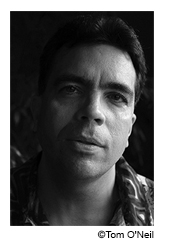
Ben Miller is the author of the debut memoir River Bend Chronicle: The Junkification of a Boyhood Idyll Amid the Curious Glory of Urban Iowa. He has published in AGNI, Ecotone, the Kenyon Review, the Antioch Review, Raritan, Salmagundi, One Story, and other journals. His essays have been reprinted or noted six times in Best American Essays, and his awards include fellowships from the Radcliffe Institute for Advanced Study at Harvard University and the National Endowment for the Arts. He lives in New York City with
his wife, the poet Anne Pierson Wiese.

 “I was born on a battlefield in the middle of a battle,” begins my short story “Son of the General,” written many years ago, and I think I’ll start there for lack of any better place. I’ve always had trouble knowing when to stop and where to begin. That dilemma is an essential element of who I am. The way time compacts, twists, implodes, and dissolves, rendering linearity all but moot.
“I was born on a battlefield in the middle of a battle,” begins my short story “Son of the General,” written many years ago, and I think I’ll start there for lack of any better place. I’ve always had trouble knowing when to stop and where to begin. That dilemma is an essential element of who I am. The way time compacts, twists, implodes, and dissolves, rendering linearity all but moot.
In a ninth grade English class at Sudlow Junior High I delivered a serious ten-page report on a children’s picture book titled Who Needs Donuts? The artist, Mark Alan Stamaty, drenched pages with ink until they appeared to fan like a cobra in the corners, flatten like strip-mined hills in Southern Illinois, or bleed like unfurled Civil War bandages. Oh, and there were the clobbered faces of mysterious characters tucked in there. See them? Classmates gawked. Junior High, picture book, didactic lecture. It all fit for me—if not for them. It fit perfectly with the incinerating intensity of a large family crammed into a small house and a city stretched precariously along a bend the Mississippi River flowing south like the world’s largest ink spill. I think I got a D from Miss Blough.
The smoke of childhood had not cleared by the time I was eighteen. The smoke in fact was thickening into the world’s sixth ocean. I could only hope I would be carried forward and I was.
I was known in college for wearing shorts in the winter and for antique harmonies oozing from the close-and-play in my dorm room. In 1982 I favored The Four Lads of 1953. I had found their album at my favorite record store, The Salvation Army. I was especially enamored with the hit “Istanbul (Not Constantinople).” My many roommates struggled with this. In a fashion fitting a person at sea, I concluded my college career by curling up my last history paper and inserting it into a catsup bottle I had emptied and stripped of its label. I placed the bottle outside the door of Professor Lucas's office in College Hall.
That paper concerned the accomplishments of Benjamin Banneker, whose biography I had encountered at age ten when I was searching the library stacks for a lifeline. Banneker, a free black man born in 1731, had surveyed the city that would become Washington D.C, and as a young man, had constructed a clock made only of miniscule carved wood pieces. My imagination clung to that clock. It required no battery. It did not need to be wound. It was as dearly homemade as the best loaf of bread—delicate but also rugged, a quirky one-of-a-kind precision instrument that possessed a life of its own. It extended, and importantly redefined, the existence of the maker. Out of that era’s toxic air there emerged many miracles of capability and courage, and the clock was another one. It ticked like the healthiest heart. A heart that had not been poisoned by despair or bitterness.





 “I was born on a battlefield in the middle of a battle,” begins my short story “Son of the General,” written many years ago, and I think I’ll start there for lack of any better place. I’ve always had trouble knowing when to stop and where to begin. That dilemma is an essential element of who I am. The way time compacts, twists, implodes, and dissolves, rendering linearity all but moot.
“I was born on a battlefield in the middle of a battle,” begins my short story “Son of the General,” written many years ago, and I think I’ll start there for lack of any better place. I’ve always had trouble knowing when to stop and where to begin. That dilemma is an essential element of who I am. The way time compacts, twists, implodes, and dissolves, rendering linearity all but moot.
